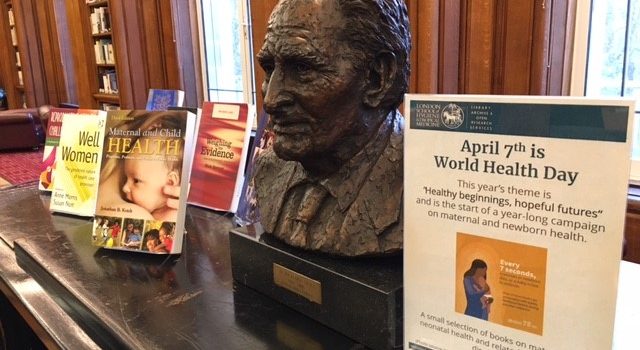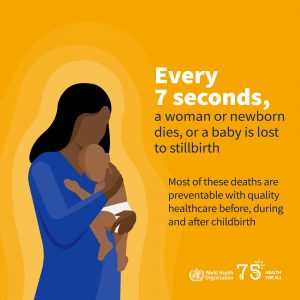Healthy beginnings, hopeful futures
“World Health Day, celebrated on 7 April 2025, will kick off a year-long campaign on maternal and newborn health. The campaign, titled Healthy beginnings, hopeful futures, will urge governments and the health community to ramp up efforts to end preventable maternal and newborn deaths, and to prioritize women’s longer-term health and well-being.
WHO and partners will also share useful information to support healthy pregnancies and births, and better postnatal health.”
“Tragically, based on currently published estimates, close to 300 000 women lose their life due to pregnancy or childbirth each year, while over 2 million babies die in their first month of life and around 2 million more are stillborn. That’s roughly 1 preventable death every 7 seconds.”
(Source: World Health Organization (WHO) https://www.who.int/campaigns/world-health-day/2025).
(Image source: World Health Organization (WHO)
You can search the library’s search tool Discover for articles and books on aspects of maternal and newborn health and related subjects.
We also have a small book display in the library reading room.
Books on display:
Kotch, Jonathan B. Maternal and Child Health : Programs, Problems, and Policy in Public Health. 3rd ed. Burlington, MA: Jones & Bartlett Learning, 2013.
Black, Robert E. et al., eds. Reproductive, Maternal, Newborn, and Child Health. Third edition. Washington, DC: World Bank, 2016.
Kamat, Deepak M, Philip R Fischer, and American Academy of Pediatrics. Textbook of Global Child Health. Elk Grove Village, IL: American Academy of Pediatrics, 2012.
Kuh, Diana, and Rebecca Hardy. A Life Course Approach to Women’s Health. Oxford ; Oxford University Press, 2002.
Yamin, Alicia Ely. Learning to Dance : Advancing Women’s Reproductive Health and Well-Being from the Perspectives of Public Health and Human Rights. Cambridge, MA: Harvard University Press, 2005.
Pathmanathan, Indra, and World Bank. Investing in Maternal Health: Learning from Malaysia and Sri Lanka. Wasington, DC: World Bank, 2003.
Freedman, Lynn P, and UN Millennium Project. Task Force on Child Health and Maternal Health. Who’s Got the Power? : Transforming Health Systems for Women and Children. London: Earthscan, 2005.
Spencer, N. J. (Nicholas J). Weighing the Evidence : How Is Birthweight Determined? Abingdon: Radcliffe Medical, 2003.
Burns, A. August (Arlene August), and Sandy Niemann. Where Women Have No Doctor : A Health Guide for Women. Albany, Calif: The Hesperian Foundation, 1997.
Wejnert, Barbara, Suzanne K Steinmetz, and Nirupama Prakash. Safe Motherhood in a Globalized World. London ; Routledge, 2009.
Okonofua, Friday E, and Women’s Health and Action Research Centre. Confronting the Challenge of Reproductive Health in Africa : A Textbook for Students and Development Practitioners. Ed. by Friday E. Okonofua. Nigeria: Women’s Health and Action Research Centre, 2014.
Morris, Anne E, and Susan M Nott. Well Women : The Gendered Nature of Health Care Provision. Aldershot, Hants, England ; Ashgate, 2002.








